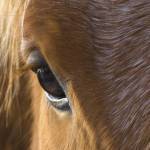Digestibility in Aged Horses

Advances in preventive medicine and nutrition are helping horses live longer, more productive lives. Little research has been performed to determine the differences in nutrient digestibility in aged horses as compared to adult horses. Despite this lack of research, one oft-held belief is that aged horses have elevated nutritional requirements due to decreased absorptive capacity of the gastrointestinal tract.
Researchers at Michigan State University compared digestibility of various feedstuffs between adult horses and aged horses. Seventeen healthy mares, eight adult (5-12 years old) and nine aged (19-28 years old), of similar type and management background, were randomly assigned to diets: hay only; hay plus a cereal-based feed; and hay plus a fat and fiber-rich feed. A study consisting of three 6-week feeding periods was used, and these periods included three weeks of outdoor feeding and three weeks of indoor stabled feeding to ensure no pasture consumption and to record feed refusals. A 72-hour digestibility trial measuring feed intake and collecting urine and feces was performed. Horses were weighed and body condition score recorded every three weeks. Feed, fecal, and urine samples were analyzed to determine digestibility and retention of specific nutrients.
No digestibility differences were noted between adult and aged horses, regardless of diet, and there were no differences recorded in daily feed, hay, or water intake, or urine or fecal output. The researchers concluded that digestive capacities between adult and aged horses are trivial, if present at all.
This study was presented at the 2011 Equine Science Society Symposium in Murfreesboro, Tenn. The proceedings from this symposium are available from the Journal of Equine Veterinary Science.








